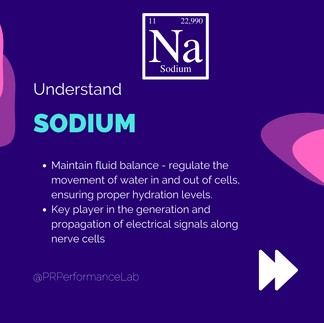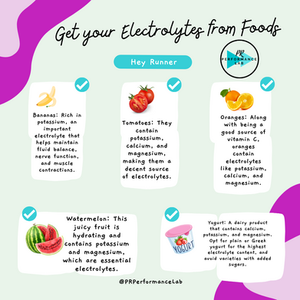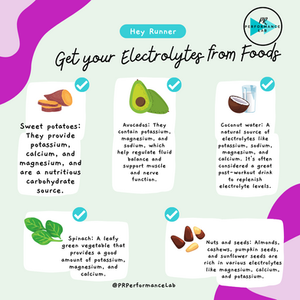What are electrolytes & what do they do for runners?
- Dayna Player Robinson

- Jul 10, 2023
- 3 min read
Updated: Sep 26, 2023

Hey Runner!
As we have started our 100+ degree time of year - Let's talk:
Understanding Electrolytes: Vital for Endurance Athletes
As endurance athletes, we push our bodies to the limit, sweating profusely and depleting essential minerals known as electrolytes. These tiny charged particles play a crucial role in maintaining fluid balance, nerve function, muscle contractions, and overall performance.
In this post, we will delve into what electrolytes are, why they are important for endurance athletes, and how to ensure proper electrolyte balance for optimal performance and recovery.
Electrolytes Defined: Electrolytes are minerals that carry an electric charge when dissolved in bodily fluids. The major electrolytes include sodium, potassium, magnesium, calcium, chloride, and phosphate. These minerals are essential for various physiological processes within our bodies, contributing to fluid balance, nerve transmission, and muscle function.
Fluid Balance and Hydration: Electrolytes, particularly sodium and potassium, play a significant role in maintaining fluid balance. They help regulate the movement of water in and out of cells, ensuring proper hydration levels. During endurance activities, sweat loss leads to the depletion of electrolytes, which, if left unaddressed, can result in imbalances, dehydration, and decreased performance.
3. Nerve Function and Muscle Contractions: Electrolytes are critical for nerve impulse transmission and muscle contractions. Calcium and sodium are key players in the generation and propagation of electrical signals along nerve cells. Potassium and magnesium, on the other hand, are involved in muscle contraction and relaxation. Proper electrolyte balance supports efficient neuromuscular communication, helping athletes maintain coordination, speed, and endurance.
4. Performance Optimization and Endurance: Endurance athletes, such as marathon runners or cyclists, undergo prolonged and intense physical exertion. The loss of electrolytes through sweat can lead to imbalances and hinder performance. Electrolyte imbalances may manifest as muscle cramps, fatigue, dizziness, and impaired cognitive function. By replenishing electrolytes during and after exercise, athletes can sustain energy levels, delay fatigue, and optimize performance.
5. Electrolyte Sources and Supplementation: Maintaining proper electrolyte balance involves a combination of proper hydration and balanced nutrition. Sports drinks and electrolyte-infused beverages can provide a convenient source of electrolytes during prolonged exercise. Additionally, incorporating electrolyte-rich foods into your diet, such as bananas (potassium), spinach (magnesium), and yogurt (calcium), can contribute to overall electrolyte intake.


6. Individual Electrolyte Needs: Each athlete has unique electrolyte needs depending on factors like sweat rate, environmental conditions, and individual physiology. Understanding your body's specific requirements can be aided by stop-the-guessing-and-do-the-testing. Sweat test is done by placing a monitor on the arm while doing a 25-30 minute treadmill run in our lab (nice Woodway treadmill). From that we can tell you exactly what you in to intake to have the best recovery. And you'll also learn how much you need to intake during your next run.
Conclusion: Electrolytes are essential minerals that endurance athletes must pay attention to in order to optimize their performance and recovery. Through proper hydration, balanced nutrition, and strategic electrolyte supplementation, athletes can maintain fluid balance, support nerve function, and promote efficient muscle contractions. Prioritizing electrolyte balance alongside training and nutrition will help endurance athletes reach their full potential and thrive in their athletic pursuits. Stay hydrated, replenish your electrolytes, and keep pushing your limits
Other posts on the importance of hydration: here.
One thing that makes that way easy -> do a hydration test with us here at PR Performance Lab

Athletes often add the Sweat Test to their Lactate Testing. Then they learn their exact zones (heart rates & paces), but also how to hydrate properly for the best run and recovery.
Our Running Assessment always includes 8-weeks of strength exercises designed to help your individual needs found during the Running Assessment.
Want more help?
Join our Running Workshop here!
Or
Learn how you can run more efficiently Running Assessment
Or
Get your FREE Strength Assessment here!
Or
Join our online 12-week strength program here!























Comments